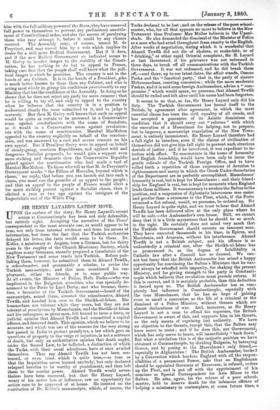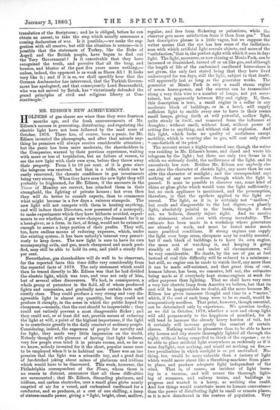SIR HENRY LAYARD'S LATEST MOVE.
UPON the surface of the story, Sir Henry Layard's recent action at Constantinople has been not only defensible, but entirely right. Accepting the narrative of the Times' correspondent as the most accurate one, as would appear to be true, not only from internal evidence and from his means of information, but from the fact that the Turkish authorities delayed his letter, the facts would seem to be these. Dr. Koller, a missionary at Angora, born a German, but for thirty years in the employ of the Church Missionary Society, which employs many Germans, recently prepared a translation of the New Testament and some tracts into Turkish. Before pub- lishing them, however, he submitted them to Ahmed Tewfik, a schoolmaster, and presumably a scholar, to revise the 'Turkish manuscripts ; and this man mentioned his em- ployment, either to friends, or in some public way. At all events, the Minister of Police, Hafiz Pasha—who was implicated in the Bulgarian atrocities, who was specially de- nounced to the Porte by Lord Derby, and who became, there- fore, a favourite of the Turkish Government—heard of the manuscripts, seized them, arrested the schoolmaster, Ahmed Tewfik, and handed him over to the Sheikh-ul-Islam. Ma- hommedans are tolerant while they scorn, but they are not tolerant of proselytism by Mussulmans, and the Sheikh-ul-Islam and his colleagues, as pious men, felt bound to issue a fetra, or judicial opinion that Ahmed Tewfik had committed a capital offence, and deserved death. This opinion, which we believe to be accurate, and which was one of the reasons for the very strong law passed in India to protect proselytes, a law which goes on questions of property to the verge of injustice, is not a sentence of death, but only an authoritative opinion that death ought, under the Sacred Law, to be inflicted, a distinction of which the Turks, with their usual adroitness, have at once availed themselves. They say Ahmed Tewfik has not been sen- tenced, or even tried, which is quite true,—as true as that the Inquisition never burned anybody, but only declared relapsed heretics to be worthy of punishment, and then left them to the secular power. Ahmed Tewfik would never- theless have been executed, but that Sir Henry Layard, weary of his entire loss of influence, saw an opportunity for action sure to be approved of at home. He insisted on the restitution of Dr. Kiiller's manuscripts, which, of course, the Turks declared to be lost ; and on the release of the poor school- master, who, for all that appears no more to believe in the New Testament than Professor Max Muller believes in the -Upani- shads. He also demanded the dismissal of the Minister of Police as a man who had acted throughout from enmity to the English. After weeks of negotiation, during which it is wonderful that Ahmed. Tewflk did not die of cholera, or snake-bite, or of "drinking," or other rapid Oriental complaint, Sir H. Layard at last threatened, if his grievance was not redressed in three days, to break off all communications with the Turkish Government. It was not redressed, and he did break them off,—and there, up to our latest dates, the affair stands, Osman Pasha and the "fanatical party," that is, the party of sincere Mahommedans, resisting concession ; while the more moderate Pashas, and it is said some foreign Ambassadors, advise " com- promise ;" which would mean, we presume, that Ahmed Tewfik should be exiled and left alive until his name had been forgotten.
It seems to us that, so far, Sir Henry Layard only did his duty. The Turkish Government has bound itself to the British, by agreement after agreement, in which the most essential clause has been the civil equality of all creeds, and has accepted a guarantee of its Asiatic dominions on condition that it should carry out " reforms " with which the execution of a Mussulman for helping, not to prepare, but to improve, a manuscript translation of the New Testa- ment, is entirely inconsistent. Sir Henry Layard therefore had a full right to interfere, even if the claims of civilisation of themselves did not give him full right to prevent such atrocious denials of justice ; and if he interfered, it was expedient to in- terfere with effect. To remonstrate in the name of humanity and English friendship, would have been only to incur the gentle ridicule of the Turkish Foreign Office, and to have called forth a repetition of those expressions of devotion to righteousness and mercy in which the Greek Under-Secretaries of the Department are so perfectly accomplished. Mussulmans' humanity is real, but is kept for Mussulmans ; and their friend- ship for England is real, but is kept for moments when England lends them millions. It wasneeessary to awaken the Sultan to the position, and a suspension of diplomatic intercourse was easier and gentler than a summons to the Fleet, which, if the Porte returned a flat refusal, would, we presume, be ordered up. Sir Henry Layard is quite right, and we trust to hear that Ahmed Tewfik has been delivered alive at the only place where he will be safe,—the Ambassador's own house. Still, we cannot deny that it is a little mysterious that he should be so much in the right. He certainly does not mind very much that the Turkish Government should execute an innocent man. They have executed thousands in his time, in Epirus, and Macedonia, and Armenia, without his interference. Ahmed Tewfik is not a British subject, and his offence is as undoubtedly a criminal one, after the Sheikh-ul-Islam has so pronounced it, as the dogma of Infallibility is Catholic law after a Council has so decreed. We can- not but fancy that the British Ambassador has seized a happy opportunity for convincing the Sultan's Ministers that he can- not always be rebuffed with impunity, for shaking the present Ministry, and for giving strength to the party in Constanti- nople which believes that revolution must precede reform. If this is correct, and it is certainly probable, then this deduction is forced upon us. The British Ambassador has so com- pletely lost influence in Constantinople, especially with the true Mussulmans, that he has no hope of gaining even so small a concession as the life of a criminal or the dismissal of a Police Minister, without threats which are almost declarations of war. And, moreover, as Sir Henry Layard is not a man to offend his superiors, the British Government is aware of this, and supports him in his threats, as the only means of regaining lost authority. We have no objection to the threats, except this, that the Sultan may have nerve to resist ; and if he does this, our Government, which has only nerve to boast, will immediately "back down." But what a revelation this is of the majestic position we have obtained at Constantinople, by dividing Bulgaria, by betraying Greece, and by posing as the Mussulman's only friend,— especially in Afghanistan ! The British Ambassador, backed by a Convention which burdens England with all the respon- sibilities of a paramount Power, asks that an Englishman should be appointed Governor of Erzeroum, is refused, orders up the Fleet, and is put off with the appointment of his nominee as Special Correspondent for Asia Minor to the Sultan. He asks, again, for the release of a poor school- master, held to deserve death for the 'infamous offence of helping a missionary to contemplate, at some future time, a translation of the Scriptures ; and he is obliged, before he can obtain an assent, to take the step which usually announces a coming declaration of war. Is it possible,—we make the sug- gestion with all reserve, but still the situation is serious—is it possible that the statesmen of Turkey, like the Duke of .Argyll and the British people, have begun to find out the Tory Government ? Is it conceivable that they have recognised the truth, and perceive that all the brag, and bounce, and bluster of the past five years mean nothing,— unless, indeed, the opponent is as weak as Shere All? It looks very like it ; and if it is so, we shall speedily hear that the German Ambassador has intervened, that the Turkish Govern- ment has apologised, and that consequently Lord Beaconsfield, who was not moved by Batuk, has "victoriously defended the grand principles of civil and religious liberty at Con- stantinople."











































 Previous page
Previous page